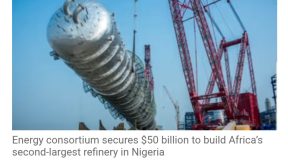The Dangote Refinery is expected to begin crude oil production soon, according to a report by S&P Global. The company’s upstream oil assets, Oil Mining Leases (OML) 71 and 72, are projected to start pumping oil before the end of the year, producing an estimated 40,000 barrels of crude per day.
“Dangote’s upstream assets in the Niger Delta, Oil Mining Lease 71 and 72, could soon provide another supply injection, with production expected to start this month and reach up to 40,000 b/d,” the report stated.
Group President Alhaji Aliko Dangote is said to remain interested in new upstream opportunities that could further expand the conglomerate’s growing energy portfolio.
As the refinery continues to grow, early challenges in sourcing crude oil risk becoming more pressing. However, Dangote has welcomed a breakthrough agreement with the Nigerian National Petroleum Company Limited (NNPC) aimed at easing supply concerns.
Under the current “crude for naira” swap arrangement, NNPC supplies Dangote with 14 crude oil cargoes or sources the equivalent value in US dollars, in exchange for the same volume of gasoline and gasoil supplied in local currency.
In August, NNPC also signed a new two-year crude supply agreement with the Dangote Refinery to ensure a steady flow of feedstock to the 650,000-barrel-per-day facility located in Lekki, Lagos.
The naira-for-crude deal was introduced under President Bola Tinubu’s directive to address the refinery’s crude sourcing challenges. The initiative allows crude earmarked for local consumption to be sold to domestic refineries, starting with Dangote’s operations.
While Aliko Dangote has expressed gratitude for the government’s intervention, which has helped lower crude prices, he has also noted that limited local crude availability had previously forced the refinery to import feedstock from the United States.
The anticipated start of crude production from Dangote’s own upstream assets is expected to strengthen the refinery’s feedstock supply and enhance domestic fuel output.

